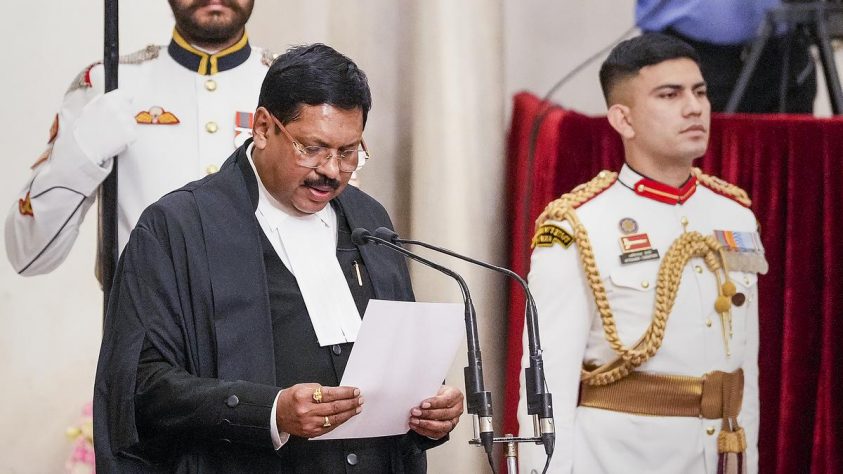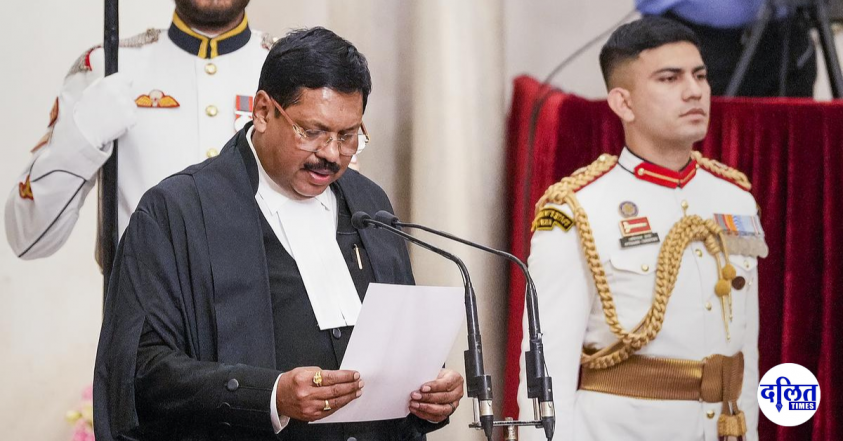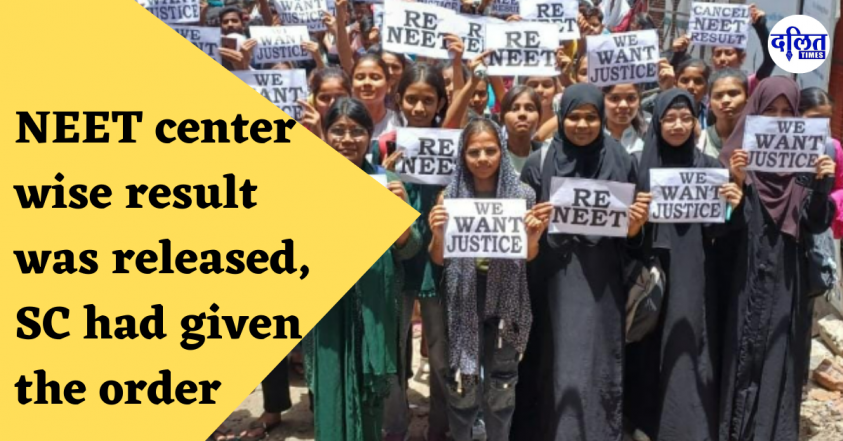“What is supreme is already known. It is the Constitution that is supreme.” — Justice B.R. Gavai”
On May 14, 2025, a day symbolizing enlightenment, equality, and compassion—history was quietly but indelibly made in the Supreme Court. Justice B.R. Gavai was sworn in as the 52nd Chief Justice of India (CJI), becoming not only the first Buddhist to hold the position but also only the second Dalit to ascend to this apex role since the court’s establishment in 1950. It fractured caste barriers long cloaked in institutional decorum and paid tribute to the enduring legacy of Dr. B.R. Ambedkar, whose vision of justice and dignity for the oppressed reverberates across every court, classroom, and constitutional forum in the country.
This milestone came at a time when questions about caste representation, meritocracy, and the inclusiveness of India’s judicial institutions are being raised with greater urgency. His appointment speaks not just to individual excellence but to the resilience of a movement.
The Journey: From Classroom in Semi-Slum Area to the Apex Court
Bhushan Ramkrishna Gavai was born on November 24, 1960, and raised in a modest home within a politically active family. His father, R.S. Gavai, was a firebrand Ambedkarite—founding member of the Republican Party of India (Gavai) and a close associate of Dr. B.R. Ambedkar.
Growing up in a semi-slum locality, Gavai attended a municipal school. Yet, inspired by Ambedkarite ideals and nurtured by a legacy of resistance, he completed his B.Com degree and pursued law from Amravati University. He entered legal practice in 1985 at the age of 25.
“It is solely due to Dr. B.R. Ambedkar’s efforts that someone like me, who studied in a semi-slum area at a municipal school, could attain this position,” said Justice Gavai.
His early years reflect the intergenerational impact of political consciousness—he was not only aware of his marginalisation but also equipped with a vision to transcend it.
Also Read: Buddha Poornima: A Life of Peace, Sacrifice, and Eternal Truth
Climbing the Judicial Ladder with Integrity
Justice Gavai’s legal journey has been marked by steadfast commitment, intellectual clarity, and unwavering integrity.
• November 14, 2003: Appointed as Additional Judge, Bombay High Court.
• 2005: Elevated as Permanent Judge.
• Served across benches in Mumbai, Nagpur, Aurangabad, and Panaji, earning a reputation for constitutional sensitivity and balanced judgments.
• May 24, 2019: Elevated to the Supreme Court of India.
• May 14, 2025: Sworn in as Chief Justice of India, following recommendation by outgoing CJI Sanjiv Khanna and approval by the Union Law Ministry.

His career is characterized not by sensationalism but by a quiet, principled adherence to constitutional propriety. While many judges draw attention through media headlines, Gavai built a legacy grounded in jurisprudential depth and democratic conscience.
His elevation is a landmark in a judiciary historically lacking in caste diversity. Since 1950, only seven judges from Scheduled Castes and Scheduled Tribes have served in the Supreme Court—a dismal statistic in a nation where SCs and STs make up over 25% of the population. His appointment challenges the judiciary to reckon with its Savarna hegemony and caste opacity.
The Legacy of R.S. Gavai: Torchbearer of Ambedkarite Politics
Justice Gavai’s rise is deeply interwoven with the formidable public life of his father, R.S. Gavai:
• Founding member of the Republican Party of India, grounded in Ambedkarite ideology.
• Served as Member of the Maharashtra Legislative Council (MLC).
• Held roles as Chairman, Deputy Chairman, and Leader of the Opposition in the Maharashtra Assembly.
• Served as Governor of Bihar, Sikkim, and Kerala.
• Elected to both the Lok Sabha and Rajya Sabha, admired for his principled politics and commitment to social justice.
Through his father, B.R. Gavai inherited not just legal acumen but a lifelong commitment to Ambedkarite values—resistance, representation, and reform.
The ideological roots run deep—this is not a tale of sudden social mobility but one nurtured through generations of struggle, political courage, and Ambedkarite pedagogy. R.S. Gavai’s life is a blueprint for institution-building among the oppressed.
Also Read: Stripped of Dignity, Paraded by Upper Caste: The Public Humiliation of a Dalit Man
A Historic Correction to Judicial Exclusion
India’s higher judiciary has long been criticized for its Savarna overrepresentation and Bahujan exclusion. Justice Gavai’s elevation symbolically corrects this structural inequity and affirms that caste consciousness must be central to constitutional morality—not just as rhetoric, but as practice and design.
This correction is not merely symbolic; it offers Bahujan communities a glimpse of what inclusive governance could look like, challenging the myth of ‘merit’ as caste-neutral. It forces reflection within the judiciary on the ways exclusion has been systemically perpetuated.
A Constitutional Moment, A Bahujan Milestone
Justice Gavai’s appointment is both a constitutional milestone and a Bahujan triumph. It rekindles hope for those historically betrayed by the state and its institutions. Echoing Ambedkar, his rise reminds us: the path to justice is long, but never impossible.
It also stands as an invitation—to legal institutions, law schools, and civil society—to reimagine access, inclusion, and accountability from the perspective of the most marginalized.
Outstanding Contributions of Justice B.R. Gavai: A Beacon of Constitutional Morality and Social Justice
During his tenure at the Supreme Court (2019–2025) and earlier in the Bombay High Court, Justice Gavai authored several landmark judgments that reflected his deep commitment to constitutional morality, social justice, and procedural fairness.
• Reservation in Promotions: He upheld affirmative action in government promotions, aligning with precedents like Indra Sawhney II and M. Nagaraj, reinforcing representation as a constitutional right.

• SC/ST (Prevention of Atrocities) Act: He strongly defended the Act’s constitutionality, particularly following the 2018 Subhash Kashinath Mahajan judgment, ensuring protections for Dalits and Adivasis were not diluted.
• Minority Rights and Secularism: In cases involving religious freedoms, he consistently emphasized inclusive interpretations of Articles 25 and 26, safeguarding the rights of minorities, including Buddhists.
His jurisprudence bridges legal reasoning with lived experiences, anchoring the Constitution as a tool for transformative justice. His judgments are studied in classrooms where students seek not just legal precedent, but moral courage.
Strengthening Representation in the Judiciary
Justice Gavai’s presence on the bench stands as a powerful act of defiance against Savarna dominance in the judiciary. As the second Dalit and the first Buddhist to hold the post of CJI, his journey from a municipal school in a semi-slum to the apex court is not just personal—it is political.
Also Read: Four Months of Thirst: The Social Boycott of 70 Dalit Families in Haryana’s Madanhedi Village
He has often credited Dr. Ambedkar’s vision for shaping his trajectory. Through his example, he offers Bahujan youth a roadmap to reclaim institutions historically closed to them. His story is not just of entry—but of transformation, opening doors that were long sealed shut.
Advocacy for Ambedkarite Constitutionalism
Justice Gavai has repeatedly acknowledged his ideological debt to Dr. Ambedkar:
“It is solely due to Dr. B.R. Ambedkar’s efforts that someone like me, who studied in a semi-slum area, could attain this position.”
His philosophy is deeply Ambedkarite—justice is not just legal resolution but a transformative force dismantling caste and enabling liberty, equality, and fraternity. His judgments and public remarks reflect a commitment to this vision, where the law becomes a tool for liberation, not privilege.
His legal imagination reflects the radical core of the Constitution—not in abstract interpretation, but in using law as an instrument of social change.

Mentorship and Encouragement for Bahujan Youth
Though less publicized, Justice Gavai has engaged actively with law students and first-generation advocates, especially across Maharashtra and Central India. He has spoken on constitutional values, encouraged judicial diversity, and mentored students navigating the Savarna-dominated legal ecosystem. His life stands as a living curriculum in Ambedkarite constitutionalism.
Such engagements, though informal, shape an emerging generation of Bahujan legal thinkers who see not just a role model, but a fellow traveler who made it through the same barriers.
Bold Statements in Support of Constitutional Supremacy
At a time when many institutional heads avoid politically charged declarations, Justice Gavai has remained clear and courageous in affirming the primacy of the Constitution.
“What is supreme is already known. It is the Constitution that is supreme.”
This is not mere rhetoric—it’s a reaffirmation that the judiciary serves neither governments nor dominant castes, but the people through the Constitution.
In an era of institutional compromise, such clarity is not just rare—it is radical.
Commitment to Secularism and Interfaith Harmony
A Navayana Buddhist, Justice Gavai has always championed secularism and interfaith harmony. He has emphasized ethical governance over religious orthodoxy, drawing from Ambedkar’s rationalist tradition. His swearing-in on Buddha Purnima amid rising polarization symbolized a return to spiritual humanism and inclusive justice.

At a moment when religiosity is wielded to divide, his secular spirituality reminds us that justice begins with empathy and ends in equality.
The Constitution has not only found an interpreter—but also a guardian, a reformer, and a believer. His ascent is more than symbolic. It is a reminder that the promise of equality is not a relic, but a living, striving reality.
A Secular Mind with a Buddhist Soul
Despite being the first Dalit CJI, Justice Gavai identifies first and foremost with India’s secular constitutional ethos. Deeply rooted in Navayana Buddhism—a rational, ethical, and anti-caste interpretation of the faith propagated by Ambedkar—Gavai embodies a spirit that values human dignity over ritual.
His swearing-in shortly after Buddha Purnima was not a coincidence. It symbolized liberation from caste hierarchy and a recommitment to values of equality, reason, and fraternity.
In embodying both legal rigor and spiritual humility, Justice Gavai reminds us that to serve the Constitution is to serve the people—and to serve the people is to believe that justice must begin where exclusion once reigned.



